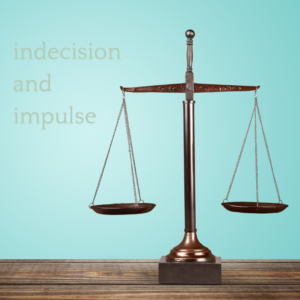The Power of Big Bold Decisions
Last month, we dove into decision paralysis and how we can get stuck making the small, everyday choices that often weigh us down. If you missed it, I shared strategies for tackling the thousands of tiny decisions we make daily without overthinking them. (You can catch up on that blog here.) But now, we’re taking it up a notch—shifting our focus to making the Big Bold Major Decisions that can truly shape the course of our lives.
When it comes to life-altering choices, the stakes are higher, the emotions more intense, and the pressure can be overwhelming. How do we make decisions that move us toward a fulfilling, purposeful life without being held back by fear? Today, we’re diving into a practical approach to making those bold decisions with clarity, faith, and a sense of balance.
Let’s jump in and explore how to confidently take the Bold Route when it matters most!

Understanding the Difference: Small Choices vs. Big Bold Decisions
Not all decisions are created equal. Every day, we make countless small choices—what to wear, what to eat for lunch, or how to structure our to-do list. These decisions, while numerous, don’t carry the same weight. If you choose the “wrong” meal or spend 20 minutes rearranging your schedule, the consequences are usually minor and easy to fix. These small decisions form the rhythm of our day, but they rarely alter the course of our lives.
On the flip side, life-altering decisions—the Big Bold Major Decisions—come with complexity, weight, and long-term impact. Choosing whether to move to a new city, change careers, start a business, or take a leap of faith into the unknown can shift the entire trajectory of your life. These decisions hold the power to open doors to new opportunities or teach us lessons in resilience and growth. But with higher stakes comes greater pressure.
It’s easy to feel stuck or even paralyzed when faced with a bold decision. The fear of making the wrong choice, the uncertainty of what lies ahead, and the unknown outcomes can cause us to hesitate. Yet, it’s these very decisions that shape who we are, the adventures we take, and the legacy we build.

Finding Balance in Bold Decisions
Making bold decisions is not about saying “yes” to everything OR fearfully avoiding risk at all costs—it’s about finding a balance. If you’ve seen Yes Man with Jim Carrey, you know the comedy that unfolds when someone goes to the extreme of saying “yes” to every opportunity. At first, Jim Carrey’s character feels alive and free, embracing life’s endless possibilities. But soon, he realizes that saying “yes” to everything, without any discernment, can lead to burnout, chaos, and consequences he didn’t anticipate.
On the other hand, we all know what it’s like to be paralyzed by fear, overthinking every possible outcome, and ending up stuck, afraid to make any move. In that space, life becomes stagnant. The desire to avoid discomfort or failure can keep us from stepping out, but at the same time, playing it too safe means we miss out on life’s adventures and growth opportunities.
This is where finding the middle ground becomes essential. Bold decisions don’t have to mean reckless ones, and cautious planning doesn’t mean avoiding risk altogether. It’s about striking a balance—between faith and reason, boldness and thoughtfulness. It’s learning to say “yes” when an opportunity aligns with your goals and values, but also knowing when to say “no” if it’s not the right time or fit.
By embracing the space between fear and recklessness, we create the freedom to make decisions that are both bold and intentional.

Understanding Your Decision-Making Style
We all have a natural approach to decision-making, whether it leans towards impulsiveness or indecisiveness.
Indecisiveness can lead to analysis paralysis, where overthinking causes missed opportunities and stress from the constant “what-ifs.” On the other hand, impulsiveness can result in regret from hasty choices, like an ill-considered purchase or move.
We all have our own natural tendencies when it comes to decision-making—some of us make quick choices, while others get stuck in indecision. Personally, I often find myself agonizing over the small decisions but diving into the big ones without enough thought—a combination that can lead to some messy outcomes.
Lately, I’ve made a commitment to doing better by taking a deeper dive into the art of discernment. I’ve been researching and studying different strategies to help me make more thoughtful decisions, and I’m determined to grow from my past mistakes. Now, I want to share the insights I’ve gathered, so you can benefit from the lessons I’ve learned and avoid some of the missteps I’ve taken.
Self-awareness is key here. Do you tend to overanalyze, or are you more impulsive? Take a moment to reflect on your natural tendencies, because understanding this is the first step. In the next section, I’ll walk you through a system for making bold decisions. By honestly evaluating how you approach choices, you’ll be better equipped to make decisions that align with your goals and values.
Are you ready to take control of your decisions and move forward with confidence? Let’s do it together!

A System for Bold Decision-Making
Big, bold decisions can sometimes leave us overwhelmed, unsure of where to begin. This step-by-step system will guide you through the decision-making process, helping you feel clearer and more confident along the way. Write down your answers as you move through each question—this will help you reflect and keep moving forward. Some of the questions outlined here are inspired by insights from the study, “Everyday Guidance For Making Everyday Decisions” by Proverbs 31 Ministries (https://proverbs31.org/, accessed September 2024).
Before we dive in, take a moment to think about a decision that’s been weighing on your mind lately. What’s keeping you up at night or causing you stress? Write it down—this will help you stay focused as we move forward.
Here we go…
1. Does this decision have a moral or ethical component?
Start by asking: Is there a clear right or wrong choice in this situation?
If yes: Reflect on God’s Word. Does scripture guide you toward a specific course of action? If so, let that be your guide—choosing the right path, even when difficult, brings peace.
If no: Move on to the next question, keeping your heart open to the bigger implications of your choice.
Next step: Now, let’s think long-term.
2. Does this decision have long-term implications for my life, relationships, or faith?
Consider whether this choice will affect your future. Will it impact your life one, five, ten, or twenty years from now? Will it shape your relationships with family, friends, or your faith?
If yes: Continue through the rest of the questions to ensure you’ve considered all angles before making any commitments. Seek wise counsel from those you trust to gain further clarity and perspective.
If no: The decision might be smaller than it seems, allowing you more freedom to choose. Continue to the next question for clarity and perspective.
Next step: Let’s check in with your emotions.
3. Am I making this decision based on emotion alone?
It’s important to honestly assess whether emotions like fear or excitement are driving your decision. Are you reacting out of fear of missing out, or are you getting swept away by excitement without considering the consequences?
If yes (or not sure): Acknowledge those emotions but give yourself time for them to settle. Revisit the decision when you can approach it more calmly, ensuring you aren’t led by temporary feelings.
If no: Great! You’re keeping emotions in check. Move on to the next question for deeper insight into your values and purpose.
Next step: Now, let’s explore your alignment with your purpose and values.
4. Does this decision align with my values, purpose, and God’s plan for my life?
A bold decision should always feel aligned with who you are. Ask yourself: Does this choice reflect my core values and the path I believe God is leading me on?
If yes: You’re on the right track. Take a moment for self-reflection and prayer, making sure this decision keeps you focused on your purpose. When you feel peace, move on to the next step.
If no: Reconsider. You may need to shift direction if this decision pulls you away from your true self and purpose. Still unsure? Move forward to the next question to explore readiness.
Next step: Let’s see if you’re fully prepared.
5. Am I ready for this?
To determine whether you’re ready, take a moment to write down the best- and worst-case scenarios. Visualizing both outcomes helps you stay grounded and clear.
If yes: Take a step forward. By preparing yourself for the challenges and opportunities ahead, you’ll feel more confident in your decision.
If no: It’s okay to wait. Give yourself time to grow into this decision. Revisit it later when you feel more equipped to handle the outcomes.
Next step: Before fully committing, let’s break it down into smaller steps.
6. What is one small step I could take toward this decision that isn’t a major financial or time commitment?
Instead of diving in headfirst, think about one low-risk step you could take to explore this decision more carefully. Maybe it’s having a conversation with someone who’s been through a similar experience, reading a book, or trying out a service on a trial basis.
If yes: Great! Taking small steps allows you to gather more information before making a big commitment. This reduces pressure and lets you explore without fear of locking yourself in.
If no: Keep brainstorming ways to test the waters before fully committing. Even a tiny action can give you insight and confidence.
Next step: Finally, let’s check for peace.
7. Do I feel peace about this decision?
After going through all the previous questions, it’s time to ask: Do I feel a sense of peace about this choice?
If yes: Trust that peace. It’s often a sign that you’re on the right path, even if challenges lie ahead. Move forward with confidence, knowing God is guiding you.
If no: Don’t rush. Continue praying and reflecting until you feel that peace. It’s worth waiting for clarity before you make any major moves.
Now what??
You’ve navigated the questions, reflecting on each aspect of your decision. 💪 Now, take a moment to review your answers and assess your sense of peace. If you’ve found clarity and alignment with your values, embrace this momentum with confidence and excitement as you move forward. Your bold decision is a step toward a more fulfilling path, and you’re ready to make it with purpose.
However, if you’re feeling frustration and a lack of peace, remember that sometimes the boldest choice is to wait for the right timing. Patience can be a powerful ally in decision-making, offering the clarity needed to make more informed and fulfilling choices. Use this time to reflect and let things unfold naturally, trusting that when the moment is right, you’ll be prepared to act with assuredness.
The freedom to choose is one of the greatest gifts we have. While we may not always get it right, this freedom allows us to shape our lives and grow from our experiences. Embrace the journey of decision-making with confidence, knowing that every step—whether forward or in waiting—is part of creating a path that’s uniquely yours. Bold decisions balance fear and faith, guiding us toward a life of adventure and fulfillment.


